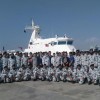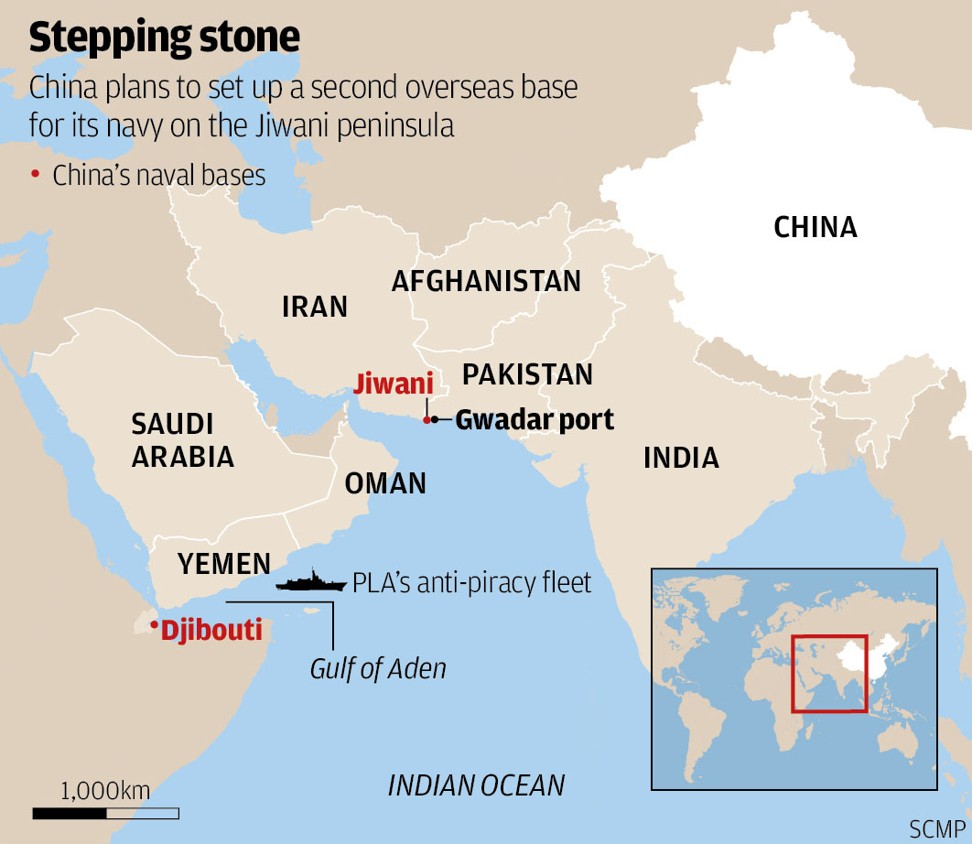China to build naval base in Gwadar Balochistan

Beijing plans to build its second offshore naval base near a strategically important Pakistani port following the opening of its first facility in Djibouti on the Horn of Africa last year.
Beijing-based military analyst Zhou Chenming said the base near the Gwadar port on the Arabian Sea would be used to dock and maintain naval vessels, as well as provide other logistical support services.
“China needs to set up another base in Gwadar for its warships because Gwadar is now a civilian port,” Zhou said.
“It’s a common practice to have separate facilities for warships and merchant vessels because of their different operations. Merchant ships need a bigger port with a lot of space for warehouses and containers, but warships need a full range of maintenance and logistical support services.”
Another source close to the People’s Liberation Army confirmed that the navy would set up a base near Gwadar similar to the one already up and running in Djibouti.
“Gwadar port can’t provide specific services for warships … Public order there is in a mess. It is not a good place to carry out military logistical support,” the source said.
The confirmation follows a report this week on Washington-based website The Daily Caller in which retired US Army Reserve colonel Lawrence Sellin said meetings between high-ranking Chinese and Pakistani military officers indicated Beijing would build a military base on the Jiwani peninsula near Gwadar and close to the Iranian border.
Sellin said the plan would include a naval base and an expansion of the existing airport on the peninsula, both requiring the establishment of a security zone and the forced relocation of long-time residents.
Gwadar port is a key part of the China-Pakistan Economic Corridor, a centrepiece of Chinese President Xi Jinping’s broader “Belt and Road Initiative” to link China through trade and infrastructure to Africa and Europe and beyond. The corridor is a multibillion-dollar set of infrastructure projects linking China and Pakistan, and includes a series of road and transport links.
Sellin also said the Jiwani base could be “signs of Chinese militarisation of Pakistan, in particular, and in the Indian Ocean”.

Chinese military observers said Gwadar had great geostrategic and military importance to China but China was not about to “militarise” Pakistan.
Zhou said China wanted better access to the Indian Ocean, which was now largely limited to the Strait of Malacca in Southeast Asia. The Gwadar port could be a transit hub for sea and land routes once the corridor’s railway was up and running, helping improve and cut the cost of logistics for China.
“The Chinese naval flotilla patrolling in the Gulf of Aden and other warships escorting Chinese oil tankers in the Indian Ocean need a naval base for maintenance as well as logistical supplies because they can’t buy much of what they need in Pakistan,” Zhou said.
Rajeev Ranjan Chaturvedy, a research associate at the Institute of South Asian Studies at the National University of Singapore, said India was well aware of China’s plans in Pakistan.
“China finds it very useful to use Pakistan against India and ignore India’s concerns, particularly on terrorism issues. That has created a lot of stress in the relationship between Beijing and Delhi,” he said.
“[But] Indian naval capabilities and experience in the Indian Ocean region are fairly good. Much better than Pakistan and China.”
Swaran Singh, a professor at the school of international studies at Jawaharlal Nehru University in New Delhi, said neither Gwadar nor Jiwani would be a wise choice for a naval base because of its proximity to the port of Chabahar in Iran, in which India has a big stake.
New Delhi has invested more than US$100 million for two berths in the port on a 10-year lease, as a way to promote trade with Afghanistan and Central Asia, bypassing Pakistan.
“Potentially both [Gwadar and Jiwani] can become vulnerable to any stand-off … between Pakistan and Iran but also China in Pakistan and India which is present in Chabahar,” Singh said.
China began building what it describes as a 36-hectare logistics base in Djibouti in 2016, with its first naval troops arriving in July last year. The troops have staged regular live-fire drills since September, a move military analysts say is meant to show China’s ability to protect its overseas interests in Africa and the Indian Ocean region.
Source: South China Monitering Post










